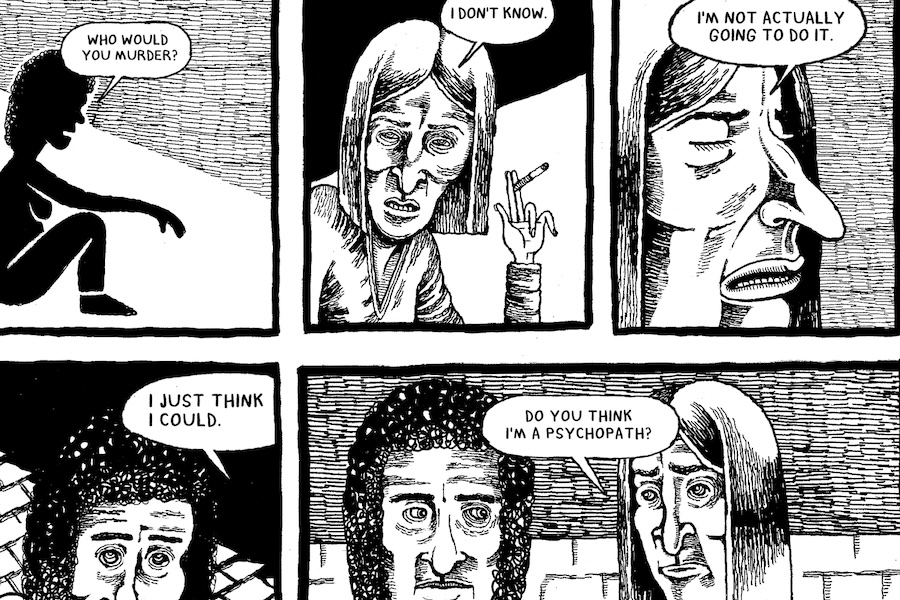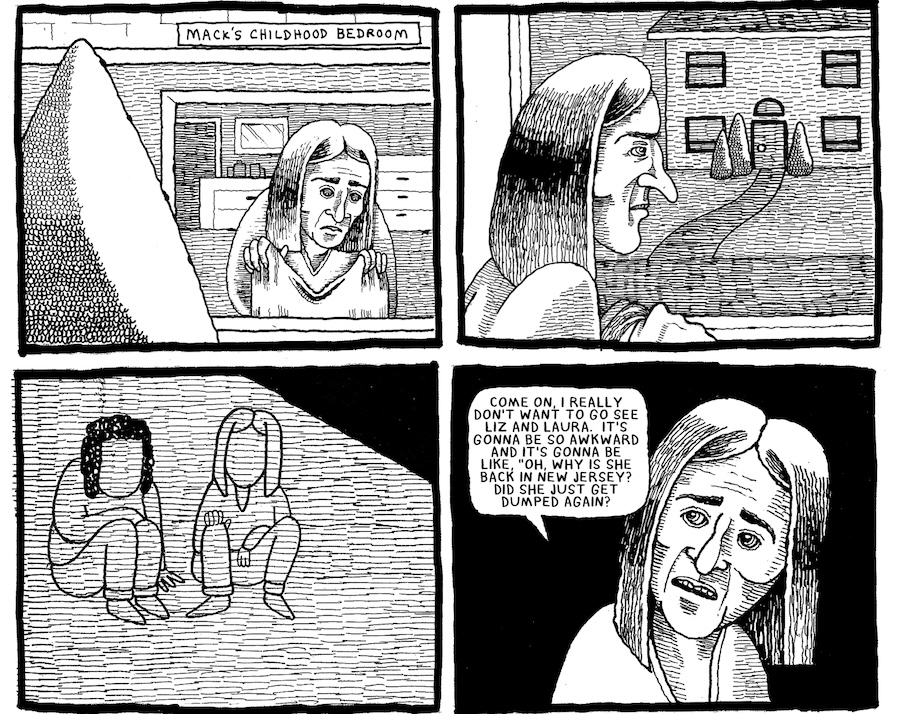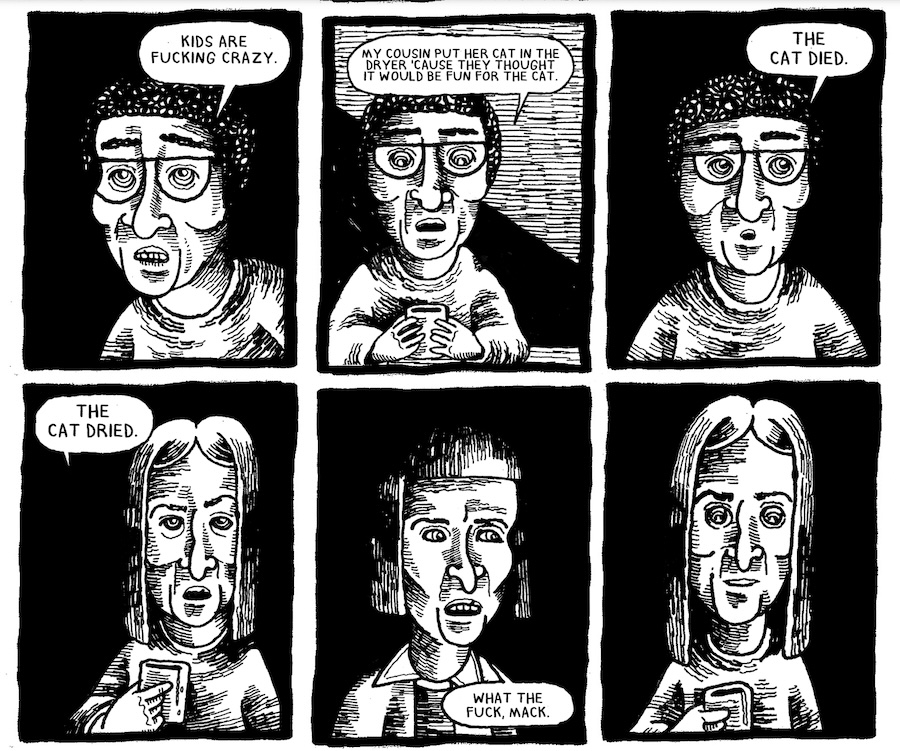Two Indie-Rock Lifers Explore Boredom and Madness in New Jersey in New Graphic Novel
Marissa Paternoster of Screaming Females and Joe Steinhardt of Don Giovanni Records explore Garden State despair in Merriment.

Paternoster and Steinhardt took advantage of the COVID lockdown to create their first graphic novel. / Image details from Merriment
Joe Steinhardt and Marissa Paternoster are in uncharted territory. The pair have been working together for years, with his long-running indie label Don Giovanni Records releasing albums by her also long-running and recently broken-up indie rock band Screaming Females since the mid-2000s. In the world of fiercely independent music, these two thirtysomethings are old pros.
But their new venture — an off-kilter, affecting and surprisingly funny graphic novel called Merriment — led them outside their comfort zones.
Steinhardt, also an assistant professor in Drexel’s Music Industry Program, provided the words, introducing us to a coterie of dry-witted New Jerseyans sipping coffee and adjusting to suburban early adulthood. But one of them, the delightfully and worryingly dark Mack, seems to be spiraling — her usual depression and restlessness giving way to stranger territory. Her BFF Denise, peacemaking mom, and increasingly wary friends don’t quite know what to do with her.
Paternoster provides the illustrations. Though the 200-plus-page Merriment is her first graphic novel, she is a lifelong artist and comic creator (in addition to being one of the top guitarists alive, according to Rolling Stone and Spin). Her panels here are populated by stony but expressive faces that can border on the grotesque, at least at first glance.
Steinhardt, who studied filmmaking as an undergrad, takes a dialogue-driven documentary approach to storytelling that lends itself nicely to Paternoster’s oddly surreal drawings full of wavy lines and talking heads. Together the art and subject matter have readers seeing what Mack sees: That terrible things are around every corner.
Paternoster and Steinhardt, lifelong New Jerseyans currently living in Philadelphia, will read from Merriment at Queen Village book shop Partners & Son on March 30th. The three of us spoke ahead of the graphic novel’s release.
Merriment comes complete with glowing blurbs from record producer Steve Albini, New Yorker cartoonist Sara Lautman and NJ comedian/actor Chris Gethard, who, in addition to praising the book, said: “New Jersey and mental illness go hand in hand.” Is that true?
Marissa Paternoster: Living under the throes of late-stage capitalism is probably the key to being “mentally ill.” Everyone should probably be “mentally ill” at this point. And that’s in quotation marks. New Jersey is an interesting place because it’s purgatorial in a way. You live in between these two giant major metropolitan destination cities, and everyone talks shit on you. But there’s a lot going on in New Jersey, actually.
Joe Steinhardt: New Jersey and Philly both grow up in that long shadow of New York, and there’s a lot of that present in this book — that “You think you’re better than me?” chip on the shoulder. And then there’s the self-hating Jersey folks, too.

Besides New Jersey, where did Merriment come from?
Steinhardt: I started writing this nine years ago, but I’m almost embarrassed telling people that, because it’s not The Odyssey. It’s not this major work or anything. … It took a long time to figure out who Mack was, and the world she operated in. Not to mention it’s not something that I do for a living. This was done in the cracks of time. … Marissa and I have been friends and working on shit together for a million years, and [I realized] this would be really great paired with Marisa’s art. We have very similar senses of humor, and a very similar sense of the world.
Paternoster: Joe sent me what looked like a screenplay probably four years ago. I read it and I liked it, but I knew in the back of my mind that doing a graphic novel while being on tour for like 100 days out of the year might be unrealistic. And then it was three months later or something that COVID happened and I had all the time in the world. So I was like: Let’s do it.
Merriment is more about dialogue than action, how did that affect your approach?
Paternoster: The thing that I tried to do, and hopefully did successfully bearing in mind that this was the first time I’ve ever made a graphic novel, was to imbue as much emotion as I could in the character’s faces while they’re having these really heavy discussions. But I also was thinking a lot about a comic like Ghost World, where the characters have this flat affect and they don’t really seem to emote heavily in any which way, unless something really intense happens. Something about that very droll aesthetic when it comes to drawing paired nicely with Joe’s writing, because Merriment is a lot of stories about listlessness and hopelessness and just the banality driving you towards, in this case, madness.
Steinhardt: The way I wrote this, I really distanced myself from the characters. Hearing Marisa talk about it, it almost doesn’t feel I wrote them. … There’s these times I really want Mack to say something different. I really want Denise to do something different. And I think for me that’s what the story is about. I don’t know. That might sound like completely insane.
Paternoster: Mack is a really relatable millennial character because she wants to go to New York so life can happen. But what does she actually mean by that? She has no plans. She has no career trajectory. She has seemingly no hobbies or interests. She just wants to be in New York. And I think we’ve all probably learned the hard that you can’t just go somewhere and life happens to you. That’s not the way it works.

Mack seems to be spiraling, like things are just getting gradually worse inside her head. But the people around her don’t always know how to handle it.
Steinhardt: In some fiction, especially if you’re writing episodic TV, each line is so important, everyone says the exact right thing. Then in real life, when you’re presented with these situations, you don’t necessarily fumble, but you don’t get a first down. And then you go back in your head and think I wish I did it like this. … And it’s not so much about the moral judgments of the characters in Merriment. I don’t think anyone’s a really bad person, right, like Mack might have some thoughts that are icky, but …
I was gonna ask, do you feel more like Mack or Denise?
Paternoster: I’m definitely Mack, but I want to be Denise.
This book surprises you with its funny parts. The humor is earned, and based on these really fleshed-out personalities.
Steinhardt: One of the reasons we’re friends is that we have a very similar sense of humor. We’ll go on long car trips or tours or whatever and we’ll be characters with each other. Even our jokes all involve either creating characters or taking people that we know and making them into characters, and stepping outside of our bodies. I think at some level neither of us like our own bodies, but we’re working on it. It’s fun to step outside of our bodies and be somebody else for a minute. This was a great thing for us to work on together and I want to do another one with her.
Now that you’re not out on tour all the time, maybe you’ll have time?
Paternoster: I mean, I’ve been at home a lot more. I’m certainly drawing a lot more. I knew that executing a graphic novel would be a massive lift. I was hesitant to do it because I didn’t want to start it and then it just exist in parts just for years and years. I wanted to actually get it done. But now Joe and I have some kind of timeframe that we can reference if we ever decide to make something again and I do know how much work it is.
Steinhardt: When we put this project together, when we did a Kickstarter and everything, we were like, “Oh, it’s going to be a 120-page graphic novel, and it’s COVID we have all this time, so we’ll have it out in a year.” And it became a 248-page thing that took three years.
You both always seem to work in the independent art and music world. What it is that draws you to that side of things?
Steinhardt: Disdain.
Paternoster: Yeah, pretty much. Yes. I just don’t want anybody making any creative executive decisions on my behalf. There’s no need for it either. I’m not so busy that that I can’t handle it myself.
Steinhardt: The infrastructure of distribution and promotion, it’s so tightly controlled. I actually do want this book to be To Kill a Mockingbird. I do want Screaming Females to be the Beatles, but it has to be on our own terms.

Steinhardt and Paternoster will read from Merriment on March 30th, 6-9 p.m., at Partners & Son, 618 South 6th Street.


